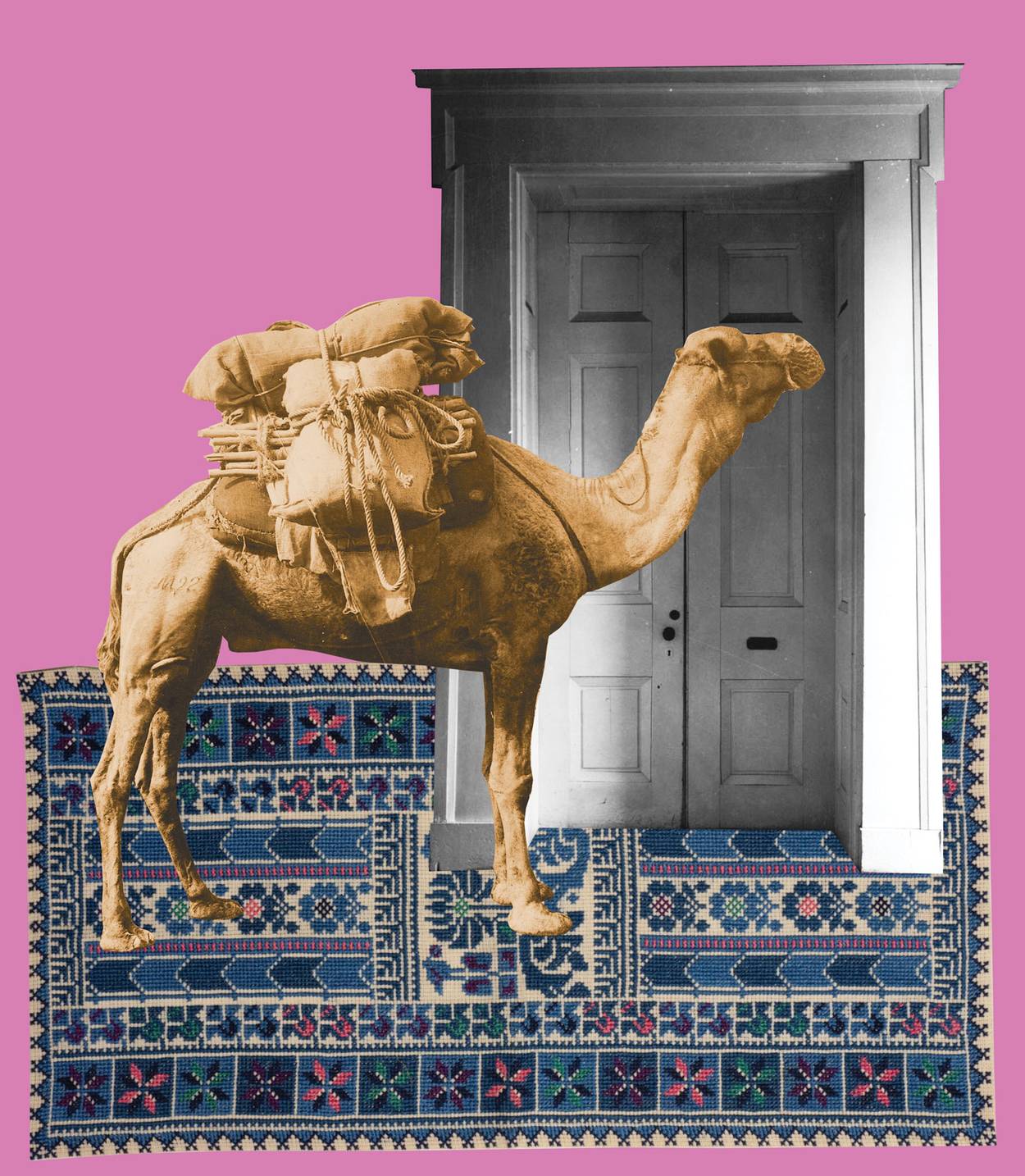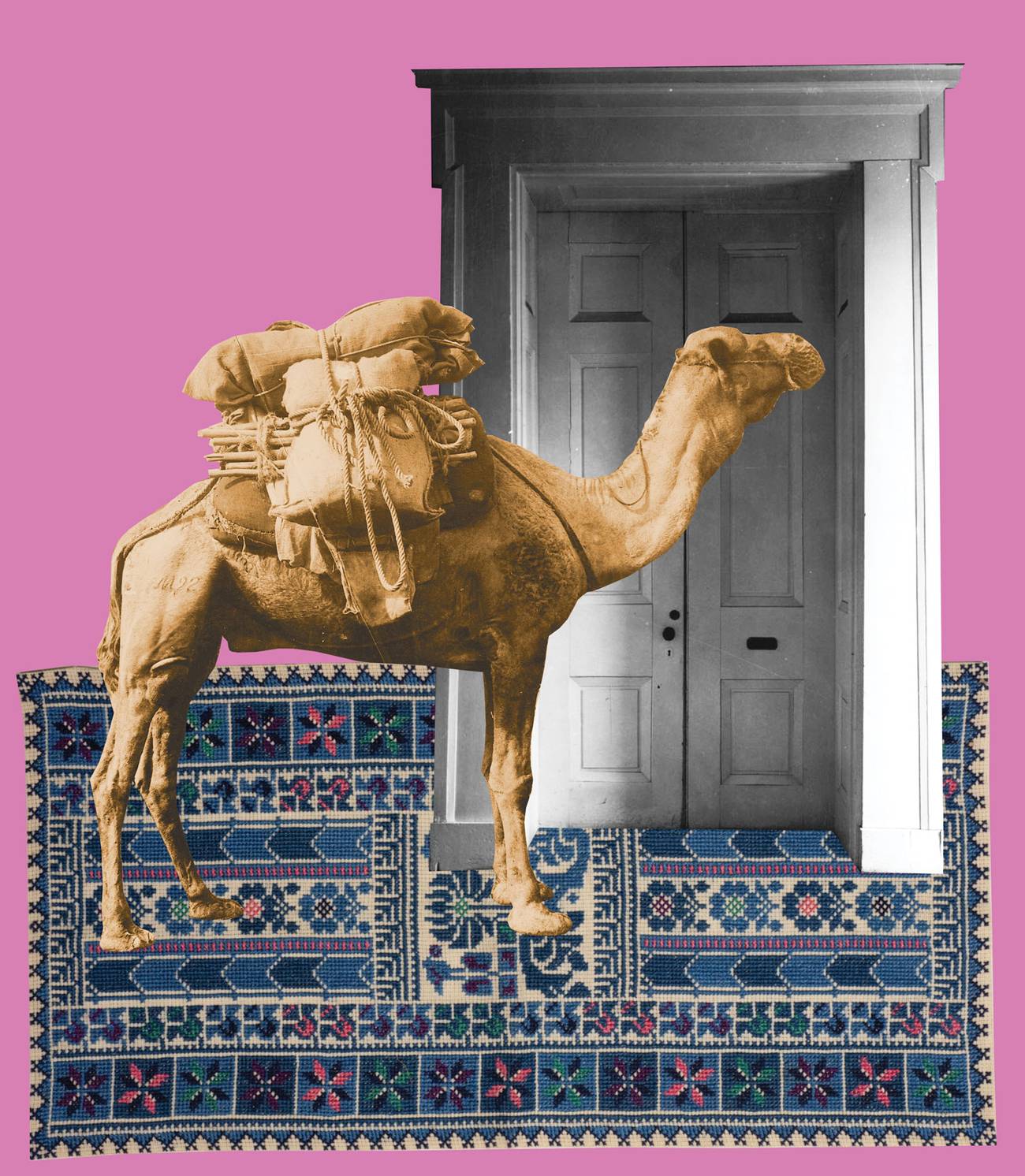From Knock Knock to the Goodbye
An unlikely author creates a collection of Palestinian Arabic colloquial expressions




“We’re all the children of nine—kul-na iw-laad ti-sa.”
That’s how Robby Berman, an American Israeli religiously observant Jew with a brown crocheted kippah atop his buzz cut, concluded his presentation in New York-accented Arabic to a classroom of 11th and 12th graders, Christians and Muslims, at the Schmidt College School for Girls in East Jerusalem in the spring of 2017. As founder and director of the Halachic Organ Donation Society, an organization generally dedicated to educating Jews about religious issues to increase organ donation, Berman was there to speak to the students about organ donation and the importance of saving lives. Among Muslims, as among Jews, the rates of organ donations are low due to questions regarding the permissibility of organ transplantation; he wanted to assert that the medical claim that brain death defines the end of life ought to be taken seriously.
But in speaking these final words, Berman was not just educating about organ donation; he was also bridging the Israeli-Palestinian divide through the use of idiom, as he is wont. He was finding the figurative language that paints a robust image rich with texture that opens the heart. The implication of that particular expression—“children of nine,” referring to the nine months we’ve all spent in the womb before being born, an expression that all the students would have understood as part of their local Arabic lexicon—made it a perfect way to end his speech that day: “We’re all human beings, we’re all equal.”
“To speak a language, you need to know its idioms and expressions,” Berman explained. “You can learn grammar in a classroom and vocabulary from a dictionary, but idioms are hard to come by. Usually people pick them up on the street.”
Berman had been picking up Palestinian Arabic idioms for many years. More than a decade ago, he started studying Arabic intensively and scribbling spoken Palestinian Arabic expressions, initially in transliteration, on the margins of paper scraps, the backs of dog-eared spiral notebooks, envelopes of junk mail, the flaps of a Cheerios box. In his distinctive indecipherable vertical script, he recorded expressions like “il-baab biy-faw-wet Ja-mal,” which literally means the door is big enough to bring in a camel, but figuratively means: If you don’t like it, you and your camel are free to leave—take a hike.
“I learn visually, so I had to write them all down,” said Berman. He periodically loaded the bits and pieces into an Excel spreadsheet that grew and grew. When it reached 1,000 entries, he realized that he had the makings of a book.
That book—the first and only English compilation of its kind, with more than 1,800 entries—is called Min Taq Taq: A Collection of Arabic idioms in the Palestinian Dialect. The title itself is taken from “min Taq-Taq las-sa-laa-mu a-LE-kom,” an Arabic idiom literally translated as “from knock knock to the goodbye,” meaning all the details from start to finish. The compilation was published last year by Minerva Publishing, the largest publisher of Palestinian Colloquial Arabic books. A Hebrew version was released in July 2021. Thus far, thousands of copies have been sold in English and in Hebrew, and reprinting of both is underway. (In English, it’s a second reprint.)
No other books like this exist because the Arabic language exists in a state of diglossia, where there are two registers of the same language in a speech community: amiyye, a colloquial Arabic that is spoken at home and on the street, and fusha, or written literary Arabic. Arabic speakers don’t typically compile and write down their spoken expressions. Rather, they write in Modern Standard Arabic, the modern version of Classical Arabic.
For the novice stepping up to learn the language, the lack of a collection of written-down spoken idioms can make it hard to connect, said Berman. When he began learning and speaking Palestinian Arabic, he encountered many idioms that left him clueless: “I was trying to have a political conversation with a Palestinian friend and he said, ‘hOnmar-baT il-fa-ras’—‘this is where the horse is tied.’ I said, ‘What horse? Where? You’re not a farmer! I thought you had a car!”
You can learn grammar in a classroom and vocabulary from a dictionary, but idioms are hard to come by.
The friend laughed out loud, and told him, “It’s an idiom, ya’ani, it means this is the crux of the matter, this is the critical point.” (The parallel Hebrew idiom is “poh kavur hakelev”—this where the dog is buried.)
After assembling the initial 1,000 idioms, Berman began to look for books written in spoken Arabic from Syria, Lebanon, Jordan, and Egypt and passed them on to his Arabic teachers, asking them which idioms and expressions were used in Israel and the West Bank. (Palestinian Arabic belongs to the Levantine Arabic dialect group along with the Arabic varieties spoken in Jordan, Lebanon, and most of Syria, as well as the Palestinian diaspora.) When politics complicated shipping from Syria or Lebanon to his home in Jerusalem, Berman ordered them to a friend in England or to a friend’s apartment in New York. In 2019, Christy Bandak, a Palestinian linguist and philologist whose family has been rooted in Bethlehem for centuries, joined on as editor and contributor and invested more than 560 hours in the book. In toto, Berman spent nearly $80,000 on researchers, translators and production.
Berman, whose first book was a self-published monograph on Kaddish that he penned while mourning his father in 2009, might seem like an unlikely curator of this sort of collection. He grew up modern Orthodox in Woodmere, New York, and graduated from Yeshiva University. He moved to Jerusalem in 1989, enlisted in the Israel Defense Forces, served in a tank unit, got injured, had three surgeries, and fought to return to combat. In his education, explained Berman, Israel was always portrayed as right and “the Arabs” were always portrayed as wrong. There was no nuance, no gray. “Thank God I eventually got out of that environment,” he said.
On the other hand, it makes perfect sense that a non-native speaker initiated this tome. “Natives don’t ‘worry’ about their spoken tongue,” explained Bandak. “They generally take it for granted, whereas a language apprentice needs to learn in order to communicate.” In the case of spoken Arabic, few learning materials have been published thus far.
This collection was borne out of deep curiosity and, surprisingly, spite. After Berman’s discharge from the IDF nearly 20 years ago, he studied Arabic but got discouraged and abandoned it. In 2009, he passed by a Jewish Israeli man in a café reading an Arabic book and marvelled at his ability to read with ease. “When I told him I really want to know Arabic, the stranger retorted: ‘No, you don’t. You’re speaking nonsense. If you wanted to learn, you’d take a course.’ So I did—out of spite! Just to show him I was serious.”
Arabic and Hebrew are cognate languages, with similarities in grammar and verb conjugation and many words that have an identical root or almost identical root. That made the task easier. More difficult in Arabic is pronouncing the letters. While Modern Hebrew no longer distinguishes phonetically between many of its own letters, Arabic distinguishes between the equivalent of the Hebrew letters chaf and chet, alef and ayin, tet and tav. Berman and Bandak created an intuitive transliteration system to phonetically represent Arabic idioms with Latin letters. If an Arabic letter that appears in a word is not pronounced because it’s assimilated into the following letter, it’s not transliterated. If a word in Arabic is written with a certain letter but pronounced differently in spoken Arabic, it’s transliterated as it’s supposed to be heard. Polysyllabic words are written with boldface type on the syllable receiving the stress. Capital letters have a special sound. This system enables English-speakers to intuitively pronounce Arabic words without knowing any Arabic letters. While the task was mammoth, there was also unexpected fun involved, such as the discovery of an unexpected connection between Palestinian Arabic and Yiddish: “Both languages are very creative with the curses,” said Berman, eyes twinkling.
Asked to share a favorite expression, Berman is hard-pressed. “I’m fond of ‘huw-we Haa-mel is-sil-lam bil-arD’—he is carrying the ladders horizontally. It means he’s making things difficult. It’s a funny visual, like a Laurel and Hardy sketch.”
Of course, many Arabic idioms don’t have a parallel in English. Some are specific to the point of seemingly awkward. For example, “Ti-lea-LEbil-aa-li” literally means “he came to him with high,” but it connotes someone who is yelling because he is being defensive, knowing he did something wrong.
The book has garnered praise from teachers of Arabic for filling a pedagogical need and from Jewish Israelis of all sorts, even at the presidential level. President Isaac Herzog invited Berman to his residence to praise the book. Former President Reuven Rivlin penned a handwritten response, noting a resonance with his father, professor Yoel Rivlin, who translated the first Hebrew edition of the Quran. For others, it’s the perfect diplomatic gift. Military Attaché Brigadier General Ala Abu Rokin, a Druze military attaché connected with the president’s office, ordered 20 copies to gift to visiting Arab dignitaries from the Abraham Accords. Min Taq Taqwas reviewed favorably on Alhurra TV and in the daily Palestinian newspaper Al-Quds (though Berman was referred to as an American with no mention of his Jewish identity).
Yet the book’s import extends beyond its value for non-native speakers. Min Taq Taqbears witness to the richness of Palestinian Arabic and its culture, helping to preserve oral history and capture images and messages that can be hard to convey. “That splendor breaks convention and stereotype,” said Basilius Bawardi, senior lecturer at Bar Ilan’s Arabic department and an editor who reviewed the final manuscript. Min Taq Taq also offers Levantines in general and Palestinians living in the diaspora a tool for language revival and a means to transmit it to the next generation. “This collection of idioms strengthens and preserves Arab culture and Palestinian identity when it’s being challenged,” affirmed Mahmoud Muna, owner of the Educational Bookshop, a landmark Palestinian bookstore in East Jerusalem. Orders have come in from Palestinians living in Venezuela and Chile, even Arabic enthusiasts in China. The book also works in reverse, helping Palestinians learn equivalent expressions and idioms in American English and Hebrew.
Palestinian voices have expressed concerns, off the record, that the book has a whiff of cultural appropriation, and could have best been authored by a Palestinian. Bandak sees it otherwise: “Culture surpasses individual appropriation. Idioms are not Robby’s property. But the fact that a non-Arab had this initiative may be a call to natives to be more aware of their own rich language and foster similar publications.”Bawardi also rejected that claim: “Despite my many reservations about this book, it’s an important work that connects cultures and people.”
Learning Arabic has prompted Berman to reflect on his roots and shape his political perspective. “As I moved up class levels in Arabic, participants were more left wing politically and more sympathetic to injustices done to Palestinians,” he said. “I think it’s only natural. The more you speak with and understand people, the more you can identify, sympathize and even empathize with them.”
And argue with them.
Not long ago, Berman went to the garage to fix a dent in his new car. To negotiate the price, he used the same idiom that persuaded 30 high school students to sign organ donor cards: We’re all children of nine. We’re all human, give me a break on the price.
The owner laughed and praised his Arabic.
Did he get the discount? No.
Ruth Ebenstein is an American-Israeli journalist, historian, public speaker, and peace activist. She is writing a memoir about an Israeli-Palestinian friendship begun in a breast cancer support group.